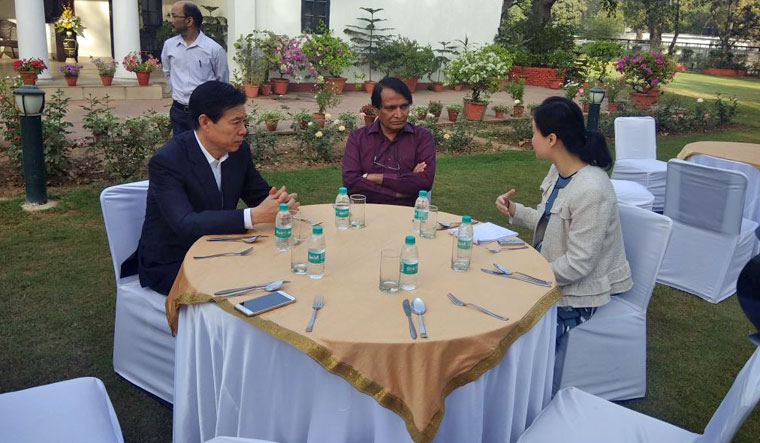While talks about Doklam might be heating up at the Line of Actual Control, on Tuesday, Union commerce and industries minister, Suresh Prabhu, was seen convincing his Chinese counterpart, minister Zhong Shan, on enhancing two-way trade relations, at the face of mounting trade deficit between the two economies.
“With China we have a huge trade deficit. Both sides agreed that the issue needs to be addressed and that China would prepare a roadmap on reducing trade deficit with India,” said minister Prabhu, after the talks held by the Joint Group between India and China.
The Joint Group is among the oldest dialogue mechanism that had existed between the two economies after the 1962-64 war. Addressing India's trade imbalance with China was taken up as the most important issue between the two countries at the Joint Group this time.
The discussion included two-way trade relations, preparation of an action plan, greater focus on Regional Comprehensive Economic Partnership (RCEP) and e-dialogue, a government statement said.
“Candid and effective discussions with India on trade relations can serve as the propeller for growth, not only between the two countries, but in the entire region,” Shan said in a statement after the meeting.
Lately, China has been concerned over the escalating regional conflicts in the Southeast Asian region, particularly in the South China sea. China is also concerned over a recent imposition of trade tariffs by the US on its steel and aluminum exports to the market.
China seeks India's cooperation, along with other countries from the region to join in its outcry over the US trade imperialism. China and South Korea were among the largest exporters of steel and aluminum to the US markets, and now face a large impact due to the Trump administration's growing trade conservatism.
The meeting of the Joint Group gains significance in that context and the breakfast meeting between the two ministers, turned out to be an icebreaker. India's commerce secretary Rita Teotia, her counterpart from the Chinese side and senior officials also meet along with other trade officials from both the countries at Prabhu's residence.
After the meeting, both the ministers exuded confidence that China would be providing more market access to Indian investors and will invest in India to build industrial parks.
Prabhu said in a media interaction after the meeting that India is likely to send a trade delegation to China shortly, and even Indian pharma companies could find a new market in China, subsequent to stricter drug pricing norms adopted in larger markets like the US and Europe.


